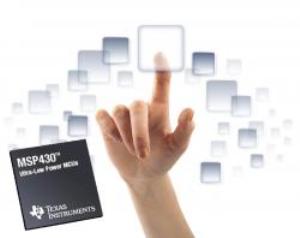Expanding the industry's lowest-powered capacitive touch portfolio, Texas Instruments Incorporated (TI) today announced a new software library, sensor tuning GUI, design collateral and support for additional microcontrollers (MCU) to ease development of capacitive touch solutions. With ultra-low power operation at less than 1uA average current per button,
 Capacitive Touch Portfolio for MSP430 MCUs
Capacitive Touch Portfolio for MSP430 MCUs
TI's MSP430™ MCUs are the industry's best choice for capacitive touch button, slider, wheel and proximity applications, including portable electronics, household appliances, and accessories. Developers interested in learning about the MSP430 capacitive touch ecosystem can access a comprehensive library of design guides, software tools and MCU support to guide them throughout the design cycle by visiting www.ti.com/cte-pr-lp.
TI's open source MSP430 Capacitive Touch Software Library now allows developers to use the recently announced MSP430G2xx5 Value Line devices and Wolverine MSP430FR58xx/FR59xx devices for button, slider, wheel and proximity capacitive touch applications. These new devices provide engineers with more options for cost-conscious and low-power applications with capacitive touch.
TI's expanded capacitive touch ecosystem now includes advanced tools to help designers throughout the development process.
- The MSP430 Capacitive Touch Pro graphical user interface (GUI) is a new PC-based tool that enables designers to evaluate, diagnose and tune capacitive touch button, slider and wheel designs in real time. This tool charts raw capacitive data from up to ten sensors so developers can visually pinpoint and perform factor analysis easier, resulting in a faster debugging, testing and time-to-market. It features user-configurable ranging, recording and printing options. To download this software, visit www.ti.com/cte-pr-ctpro.
- Estimate power consumption for a capacitive touch system even before implementing hardware with TI's MSP430 Capacitive Touch Power Designer GUI and application note. This GUI simulates the estimated average current draw for capacitive touch systems using select MSP430 MCUs, while users adjust system parameters such as operating voltage, frequency, and number of button and gate times. To download this new tool, visit www.ti.com/cte-pr-ctpd.
TI's capacitive touch experts have created several comprehensive design guides to help developers learn sensor design techniques, reduce power consumption, and improve response times for button, sliders and wheel designs.
- The new Capacitive Touch Sensing, MSP430 Button Gate Time Optimization and Tuning Guide shows developers how to optimize button performance for reduced power consumption, improved response times and scalability to include more buttons.
- TI's new Capacitive Touch Sensing, MSP430 Slider and Wheel Tuning Guide helps developers lay out sliders and wheels using multiple electrodes and optimize software to provide the most linear representation of raw capacitive data.
- The Capacitive Touch Sensing, Sensor Design Guide exposes developers to design considerations and best practices for capacitive touch hardware design including schematics, mechanicals and layout.
In addition, ultra-low power MSP430 MCUs support capacitive touch buttons, sliders and wheel functionalities on TI's haptic technology evaluation kits. The DRV2605 haptic driver evaluation module is a complete demo and evaluation platform that provides tactile feedback through touch-based interfaces. The vibrations produced by these devices provide a new, deeply enhanced user experience and unparalleled value.
Find out more about TI's capacitive touch solutions, support and related products:
TI's broad portfolio of microcontrollers (MCUs) and software
Leading the industry in MCUs for low-power, real-time control, safety and connectivity, TI continues its 20+ years of microcontroller innovation to offer the broadest microcontroller portfolio in the industry: Ultra-low power MSP MCUs, real-time control C2000™ MCUs, Tiva™ ARM® MCUs and Hercules™ Safety ARM MCUs. Designers can accelerate time to market by tapping into TI's tools, software, wireless connectivity solutions, extensive Design Network offerings and technical support.